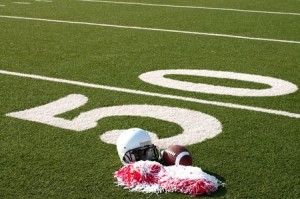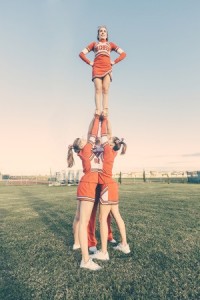Use Your Head: Kids and Sports Concussions
 School is in session, fall is on its way, and football season is upon us. Tonight is the first game of the NFL’s 96th season. It’s an exciting time of year.
School is in session, fall is on its way, and football season is upon us. Tonight is the first game of the NFL’s 96th season. It’s an exciting time of year.
If you have a child enrolled in youth sports programs, this is also a good time to educate yourself on the very real possibility of a sports-related head injury. We’ve been hearing of increasing evidence linking football to long-term brain damage, and there’s even a new movie coming out starring Will Smith as the doctor who first made that alarming connection. But, the truth is that concussions can occur in all youth sports. We’re here to dispel some myths and share some practical knowledge on the subject so you can help keep your athlete safe.
What Are the Truths?
First, let’s address some common misconceptions. Think that only professional athletes who spend years playing contact sports are susceptible to sports-related brain damage? Actually, young people’s brains are especially prone to concussion, and “sports-related concussions account for more than half of all emergency room visits by children aged 8 through 13,” according to the National Athletic Trainers’ Association. While it’s true that years of repeated head trauma increases the risk of damage, what many people don’t realize is that brain injuries sustained in youth can have lasting effects, long after they appear to have “healed.
 Another commonly held belief is that only students playing football are at risk for traumatic brain injury. This is likely because the NFL concussion lawsuits and similar stories surrounding college players have gotten a great deal of media attention. However, all student athletes run the risk of a concussion or other head injury. Soccer, ice hockey, field hockey, wrestling, swimming, volleyball, lacrosse, and cheerleading are other sports in which head injuries are common. On that note, it is often assumed that sports concussions aren’t as much of a concern for female athletes, due to a misconception that girls’ sports programs aren’t as “rough” as boys’ programs. This is also false, as anyone who witnessed this cringe-worthy moment in the Women’s World Cup can attest to.
Another commonly held belief is that only students playing football are at risk for traumatic brain injury. This is likely because the NFL concussion lawsuits and similar stories surrounding college players have gotten a great deal of media attention. However, all student athletes run the risk of a concussion or other head injury. Soccer, ice hockey, field hockey, wrestling, swimming, volleyball, lacrosse, and cheerleading are other sports in which head injuries are common. On that note, it is often assumed that sports concussions aren’t as much of a concern for female athletes, due to a misconception that girls’ sports programs aren’t as “rough” as boys’ programs. This is also false, as anyone who witnessed this cringe-worthy moment in the Women’s World Cup can attest to.
Another HUGE sports concussion myth: when you have a concussion, you lose consciousness. That’s simply not true. A blow to the head can cause a person to become unconscious, but not always. In fact, 90% of concussions do not involve a loss of consciousness.
But perhaps the biggest myth surrounding student athletes and sports concussions is that the athlete, coach, or parent can determine that the athlete is ready to get back in the game after taking a direct or indirect blow to the head. The fact is that these types of injuries are brushed off far too often. Even if the player feels fine, the symptoms of a serious head injury might not kick in until hours or even days after the impact. After a collision, fall, or head impact, the player should get medical attention before returning to the field.
But, knowing the signs of a concussion can help prevent further damage. Coaches and parents should watch for:
- Difficulty with concentration, memory, or thinking clearly
- Headache, nausea, vomiting, blurry vision, sensitivity to light and noise
- Mood swings or changes in behavior
- Excessive tiredness or change in sleep patterns
Looking out for these signs and enforcing existing game rules are two of the most effective ways to keep student athletes safe. A failure to do so may reveal negligence on the part of the coach, or the organization in charge of the sports program. If your child has suffered a sports injury and you have questions, feel free to call the personal injury lawyers at Munley Law Personal Injury Attorneys. We will review your case and answer your questions entirely for free. Fill out our email contact form or call us at 855-866-5529.
Posted in Personal Injury.
Tagged Concussion Loss Negligence









